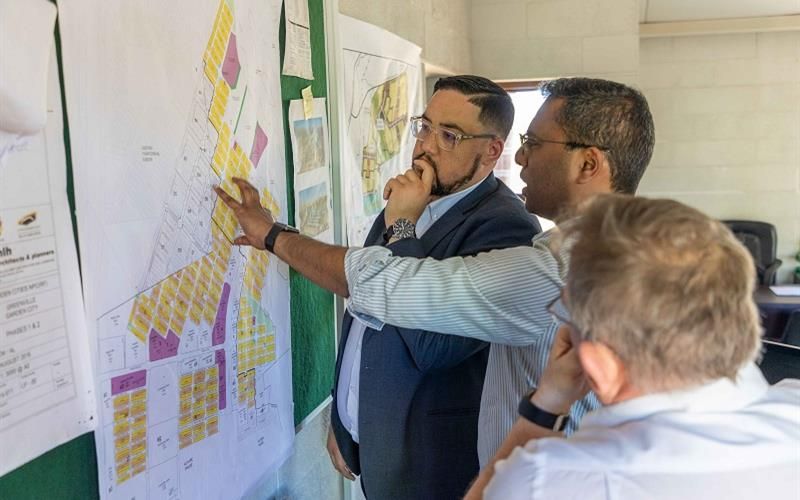The Greenville Phase 4 Breaking New Ground housing project in Durbanville is a remarkable collaboration between the City of Cape Town and Garden Cities. With a budget of R163 million, the project aims to provide affordable and eco-friendly housing for over 1,000 families by 2025. The project is notable for its innovative construction methods, such as the use of Benex Block, as well as its commitment to fairness and transparency in housing allocation. The Greenville housing project is a shining example of progress, collaboration, and sustainability for the future of housing development in South Africa.
A Collaborative Effort for Sustainable Housing Solutions
The Greenville Phase 4 Breaking New Ground (BNG) housing project in Fisantekraal, Durbanville represents a shining example of cooperation between the City of Cape Town and its ally, Garden Cities. With a budget of R163 million, this ongoing project seeks to supply affordable and environmentally friendly housing for more than 1,000 families by the close of 2025.
This endeavor stands out not just for its scope and potential to transform the lives of numerous families, but also for its inventive approach to construction and neighborhood development. During a recent trip to the project location, Mayoral Committee Member for Human Settlements, Councillor Carl Pophaim, voiced his excitement about the progress achieved so far and the possibilities it presents for the future of housing development in the area.
A noteworthy aspect of the Greenville housing project is its incorporation of alternative building methods, such as utilizing Benex Block, an economical and lightweight building material that simplifies the installation procedure. This creative tactic not only accelerates construction but also enables Garden Cities to hire both trained and inexperienced labor from the nearby community, promoting local economic expansion and involvement.
Investment and Fair Allocation in Greenville Housing Project
The City of Cape Town has showcased its dedication to the project by assigning R50 million towards its growth in the 2023/24 fiscal year. Councillor Pophaim expressed his appreciation to all participants, remarking, “We thank all staff members, contractors, and partners for making this project’s progress possible and we are excited to see the houses completed in the coming years. Thank you to Garden Cities for their partnership and for delivering such an excellent project.”
To maintain fairness and transparency, recipients of the Greenville housing project are meticulously chosen in line with the City’s Housing Allocation Policy and Housing Needs Register. This guarantees that housing opportunities are suitably distributed and that the most at-risk residents obtain the assistance they require. Crucially, the City’s political office holders do not have access to or influence over the Register and its qualifying recipients.
Furthermore, the Greenville project encourages inhabitants to take an active part in preserving the development’s integrity. Anonymous tip-offs are accepted, enabling community members to report any alleged unlawful activity or infractions that may jeopardize the project’s success.
Pioneering the Future of Housing Development
As the City of Cape Town and Garden Cities persist in their joint efforts on this groundbreaking venture, the Greenville housing project emerges as an exemplary model of innovation, advancement, and collaboration. The project not only offers a more promising future for the families who will soon reside in Greenville but also serves as a guide for sustainable and inclusive housing development throughout South Africa.
Councillor Pophaim stated, “I am looking forward to visiting again in the near future to check on its progress.” The enthusiasm surrounding the Greenville housing project is indeed tangible, and its capacity to transform lives and communities remains an inspirational force for all those involved and beyond.
1. What is the Greenville Phase 4 Breaking New Ground housing project?
The Greenville Phase 4 Breaking New Ground (BNG) housing project is a collaboration between the City of Cape Town and Garden Cities aimed at providing affordable and environmentally friendly housing for over 1,000 families by 2025.
2. What is the budget for the Greenville housing project?
The budget for the Greenville housing project is R163 million.
3. What is the innovative construction method used in the Greenville housing project?
The Greenville housing project uses the Benex Block, an economical and lightweight building material that simplifies the installation procedure and enables the project to hire both trained and inexperienced labor from the nearby community.
4. What is the City of Cape Town’s contribution to the Greenville housing project?
The City of Cape Town has assigned R50 million towards the growth of the Greenville housing project in the 2023/24 fiscal year.
5. How are the recipients of the Greenville housing project chosen?
The recipients of the Greenville housing project are chosen in line with the City’s Housing Allocation Policy and Housing Needs Register to maintain fairness and transparency.
6. Is the Housing Needs Register accessible to the City’s political office holders?
No, the City’s political office holders do not have access to or influence over the Housing Needs Register and its qualifying recipients.
7. How does the Greenville housing project encourage community involvement?
The Greenville housing project encourages community involvement by accepting anonymous tip-offs, enabling community members to report any alleged unlawful activity or infractions that may jeopardize the project’s success.
8. What is the significance of the Greenville housing project?
The Greenville housing project is a pioneering model of innovation, advancement, and collaboration, offering a more promising future for the families who will soon reside in Greenville and serving as a guide for sustainable and inclusive housing development throughout South Africa.








